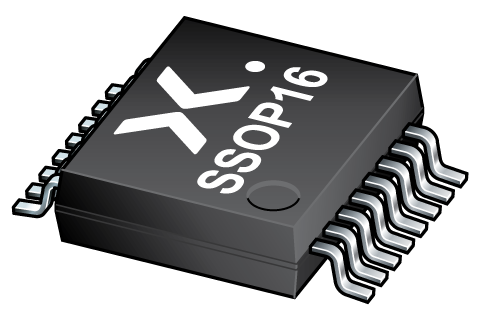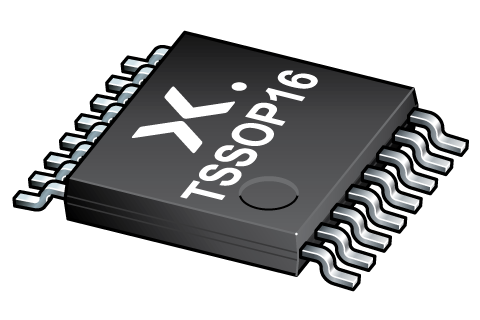
Register once, drag and drop ECAD models into your CAD tool and speed up your design.
Click here for more information74HCT4052DB
Dual 4-channel analog multiplexer/demultiplexer
The 74HC4052; 74HCT4052 is a dual single-pole quad-throw analog switch (2 × SP4T) suitable for use in analog or digital 4:1 multiplexer/demultiplexer applications. Each switch features four independent inputs/outputs (nY0, nY1, nY2 and nY3) and a common input/output (nZ). A digital enable input (E) and two digital select inputs (S0 and S1) are common to both switches. When E is HIGH, the switches are turned off. Inputs include clamp diodes. This enables the use of current limiting resistors to interface inputs to voltages in excess of VCC.
Alternatives
Features and benefits
Wide analog input voltage range from -5 V to +5 V
- CMOS low power dissipation
- High noise immunity
- Latch-up performance exceeds 100 mA per JESD 78 Class II Level B
Low ON resistance:
80 Ω (typical) at VCC - VEE = 4.5 V
70 Ω (typical) at VCC - VEE = 6.0 V
60 Ω (typical) at VCC - VEE = 9.0 V
Logic level translation: to enable 5 V logic to communicate with ±5 V analog signals
Typical ‘break before make’ built-in
-
Complies with JEDEC standards:
- JESD8C (2.7 V to 3.6 V)
- JESD7A (2.0 V to 6.0 V)
Input levels:
For 74HC4052: CMOS level
For 74HCT4052: TTL level
ESD protection:
HBM: ANSI/ESDA/JEDEC JS-001 class 2 exceeds 2000 V
CDM: ANSI/ESDA/JEDEC JS-002 class C3 exceeds 1000 V
Specified from -40 °C to +85 °C and -40 °C to +125 °C
Applications
Analog multiplexing and demultiplexing
Digital multiplexing and demultiplexing
Signal gating
Parametrics
| Type number | Package name |
|---|---|
| 74HCT4052DB | SSOP16 |
PCB Symbol, Footprint and 3D Model
| Model Name | Description |
|---|---|
|
|
Package
All type numbers in the table below are discontinued.
| Type number | Orderable part number, (Ordering code (12NC)) | Status | Marking | Package | Package information | Reflow-/Wave soldering | Packing |
|---|---|---|---|---|---|---|---|
| 74HCT4052DB | 74HCT4052DB,118 (935190000118) |
Withdrawn / End-of-life |

SSOP16 (SOT338-1) |
SOT338-1 |
SSOP-TSSOP-VSO-REFLOW
SSOP-TSSOP-VSO-WAVE |
Not available | |
| 74HCT4052DB,112 (935190000112) |
Obsolete | Not available |
Environmental information
All type numbers in the table below are discontinued.
| Type number | Orderable part number | Chemical content | RoHS | RHF-indicator |
|---|---|---|---|---|
| 74HCT4052DB | 74HCT4052DB,118 | 74HCT4052DB |
|
|
| 74HCT4052DB | 74HCT4052DB,112 | 74HCT4052DB |
|
|
Series
Documentation (10)
| File name | Title | Type | Date |
|---|---|---|---|
| 74HC_HCT4052 | Dual 4-channel analog multiplexer/demultiplexer | Data sheet | 2024-03-21 |
| AN11044 | Pin FMEA 74HC/74HCT family | Application note | 2019-01-09 |
| hct4052 | 74HCT4052 IBIS model | IBIS model | 2019-01-09 |
| Nexperia_package_poster | Nexperia package poster | Leaflet | 2020-05-15 |
| SSOP16_SOT338-1_mk | plastic, shrink small outline package; 16 leads; 0.65 mm pitch; 6.2 mm x 5.3 mm x 2 mm body | Marcom graphics | 2017-01-28 |
| SOT338-1 | plastic, shrink small outline package; 16 leads; 0.65 mm pitch; 6.2 mm x 5.3 mm x 2 mm body | Package information | 2022-06-20 |
| SSOP-TSSOP-VSO-REFLOW | Footprint for reflow soldering | Reflow soldering | 2009-10-08 |
| hc | HC/HCT Spice model | SPICE model | 2022-02-17 |
| HCT_USER_GUIDE | HC/T User Guide | User manual | 1997-10-31 |
| SSOP-TSSOP-VSO-WAVE | Footprint for wave soldering | Wave soldering | 2009-10-08 |
Support
If you are in need of design/technical support, let us know and fill in the answer form we'll get back to you shortly.
Longevity
The Nexperia Longevity Program is aimed to provide our customers information from time to time about the expected time that our products can be ordered. The NLP is reviewed and updated regularly by our Executive Management Team. View our longevity program here.
PCB Symbol, Footprint and 3D Model
| Model Name | Description |
|---|---|
|
|
How does it work?
The interactive datasheets are based on the Nexperia MOSFET precision electrothermal models. With our interactive datasheets you can simply specify your own conditions interactively. Start by changing the values of the conditions. You can do this by using the sliders in the condition fields. By dragging the sliders you will see how the MOSFET will perform at the new conditions set.
